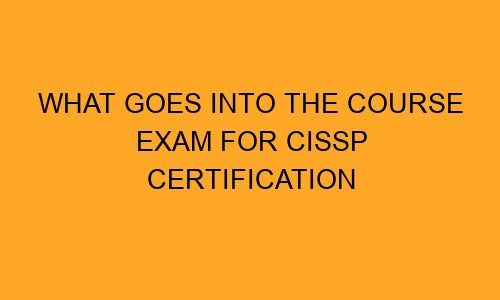CISSP stands for, “Certified Information Systems Security Professional.” This certification is the second-highest level of credential in the information security field, which means it’s a very difficult course to pass. Here’s what you need to know about studying for this exam and how it compares to other tests.
What Is CISSP Certification
CISSP certification is a globally recognized information security certification. It’s a credential that recognizes expertise in cybersecurity. The certification is offered by the International Information Security Standards Board (CISB). There are three levels of certification: CISSP, CISSP-ISSMP, and CISSP-ECP. The first two levels require passing an exam. The third level requires either experience or supervised experience in the area of information security.
Obtaining A CISSP Certification
The CISSP certification is considered one of the most prestigious security certifications available. To obtain the certification, you must complete a rigorous course exam. Here’s what goes into the exam:
- In-depth understanding of information security concepts and terminology.
- Experience with security management principles and techniques.
- Familiarity with various types of information systems and their vulnerabilities.
- Comprehensive knowledge of security engineering principles and practices.
Academic vs. Non-Academic Programs
In order to become certified as a CISSP, you need to complete an academic program and pass the certification exam. There are several CISSP certification programs available, but which one is the best for you?
The academic program offered by CompTIA provides students with an in-depth understanding of information security. This program includes lectures, readings, and hands-on training. The goal of this program is to equip students with the knowledge and skills necessary to pass the CISSP certification exam.
On the other hand, the non-academic program offered by ISACA allows students to earn their CISSP without attending any classes. Instead, they must complete a self-study course and take a two-hour examination. Although this program is less demanding than the academic program, it does not offer as much depth of knowledge. Therefore, if you are looking for a shorter route to earning your CISSP certification, the non-academic program may not be the best option for you.
Areas of Knowledge for CISSP
The CISSP Certification examination requires candidates to demonstrate their knowledge in seven areas of security administration:
Security Architecture and Design 2. Risk Management 3. Cryptography 4. Access Control Methods 5. Identity and Access Management 6. Software Security 7. Security Engineering
Candidates must be able to demonstrate their proficiency in these areas by answering questions from the CISSP exam blueprint, which is a 400-question, three-hour test covering these topics. Here are a few tips for preparing for the exam:
Review the CISSP exam blueprint and study each topic thoroughly. This will help you to better understand the types of questions that will appear on the exam and how to best answer them.
Practice answering questions from the CISSP exam blueprint. This will help you to develop a strong understanding of the material and improve your ability to quickly respond to questions from the exam.
Use practice tests provided by CertMaster to evaluate your understanding of the CISSP certification material and identify any areas that need further study.
Useful Tools for CISSP Exam Preparation
There are a few different tools that can be used to help prepare for the CISSP certification exam. First, there is the CISSP preparation guide from Pearson. This guide covers all of the topics that are on the CISSP certification exam, and it has practice questions to help you prepare for the exam. There is also the Official Guide to the CISSP Certification Exam, which is published by CompTIA and is similar to the Pearson preparation guide.
Finally, there are a number of free resources available online that can help you prepare for the CISSP certification exam. One of these resources is the Online Preparation Library from KISMEC, which contains a number of different tutorials and practice questions that can help you prepare for the exam.

